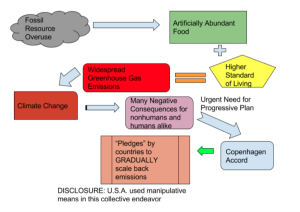2. My somewhat simple diagram visually attempts to explain the arduous and complex task of what occurred that caused multiple nations across the globe to have a common interest. The root of the problem begins with fossil resource depletion as it is in every country’s “best” interests to exploit their natural capacities. The end-uses of these resources ensure food surpluses and higher standards of living (cheapest, fastest way), which is a sign of a countries’ growing industrialism. However, fossil resource exploitation specifically derived from fossil fuel, releases large quantities of greenhouse gases that when taken into consideration with other industrialized nations or industrializing nations, becomes a global problem. The widespread emissions lead to climate change that has various affects upon different regions and nations alike in a negative manner usually. Now that most governments can no longer plead ignorant to the rapid pace of changes in the last 50-100yrs, there has been at least a semblance of acknowledgement as this has been reflected in international agreements that seek to alleviate the dangers caused by fossil resource depletion. An example of such collective action taking place can be seen at the Copenhagen Accord. As with any international agreement, climate ones especially are very tedious and time consuming as every individual nation is sacrificing “the easy road to development” in the interests of everybody taking the more challenging road to development through more sustainable means. The U.S. as revealed in the WikiLeaks, was very involved behind the scenes in making sure that a majority of nations that are part of the U.N. “pledged” (Copenhagen Accord has no Kyoto clause meaning rich nations aren’t bound to stick to their words of capping emissions) to the Accord. It will remain to be seen in the next 10 years whether any concrete agreements with definitive goals will be reached.
3.After reading through the WikiLeak cables several times over, I do not condone the U.S. for taking the steps it had taken in strong-arming countries to “put their name on the dotted line”. Personally, yes, it was a complete steamroll of distributive justice as less economically developed nations had no leverage at the table of the big boys (developed nations). Though the U.S. used an “ends justify means” mentality (procedural justice) leading up to the Copenhagen Accord that may seem altruistic to a degree, in contrast it was rather self-defeating, as the Copenhagen Accord doesn’t require developed nations to “pay their dues”. (The U.S. knew this and would rather have this then the UN’s Kyoto protocol) In effect, the international agreements have become weaker and have become more akin to “guidelines” that when crossed over, the offending country faces no or little repercussion. Another motive the U.S. has in the Copenhagen Accord and others like it, is that the countries that are the most influential in these collective treaties have the opportunity to reshape the modern world or in simpler terms =power play. For example the country that takes advantage of the present circumstances and is readily capable of adapting to the future can “afford” to give the less developed nations aide…(I mean bribery) as a cost of leaving the others in the dust so to speak. On a side note, the U.S. can “afford” these contributions of aide because it doesn’t literally cost the gov’t itself anything, as they only have to print money so in the end, the public foots the bill and the less developed nations receive currency that is worth less over time instead of tangible real assets. The State Department cables shouldn’t have been made public as this reduces the leverage the U.S. has when negotiating (imagine if every time I tried to negotiate, the other party knew everything…no point in negotiating as I won’t get a “fair” trade). Procuring an international treaty in the bests interest of everybody that every counterpart agrees on will never happen so the next best option is using leverage (define that how you will).


Hey Gershom, my name is Amir, and I thoroughly liked your diagram, asides from the message behind it, I liked the creative effort you put into streamlining the cycle into single steps. I agree with your opinion on the unfairness that comes along with the practices the US partook in when it came to this topic, which can reflect negatively on the US environment as a whole.
Check out my post!
http://sites.psu.edu/geog30/2016/04/10/climate-change-and-the-wikileaks/
Hi Gershom, I am Justin and here is a link to my blog post: http://sites.psu.edu/geog30/2016/04/09/module-9-climate-change-16/.
I really liked your systems diagram with your creativity. I thought that it was very easy to follow and was explained very easily. You and I had very similar viewpoints on the United States cable leaks as to whether they should have been posted or not. I also thought that the ends justified the means as you had described in your post.
Hi Gershom, I’m Natalie. Your use of colors in your chart made it very easy to read which was a good choice. I also agree that the United states was wrong to use unethical means to gain leverage. Your focus on “leverage” was very clever and a good way to describe the situation. Overall you had a very solid grip on the ordeal and how it related to climate change, it was an interesting read. If you want to check mine out here it is:https://sites.psu.edu/geog30/wp-admin/post.php?post=54792&action=edit
Hi Gershom. My name is Ben and I found your post to be very interesting. Although we had different points of view as to whether the cables should have been made public or not, I now clearly see where you are coming from. Your idea of using leverage is great. Check out my post if you want to see my thoughts. http://geog030.dutton.psu.edu/2016/04/09/ben-ceci-module-9-climate-change-copenhagen-accord/